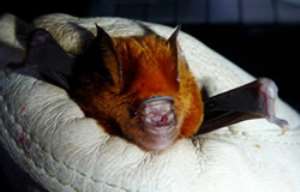
A team of scientists from Ghana and Germany has established a research program into bat ecology and human health in Ghanaian communities.
Bats provide important ecosystem services by controlling insect populations to the benefit of farmers, as well as maintaining forest health, through the role of bats in dispersing pollen and seed over large distances.
However, bat populations worldwide are declining as a result of human impacts. According to the scientists, their similarity to humans can help in understanding the dynamics of epidemics such as the common cold.
The Kumasi Centre for Collaborative Research in Tropical Research (KCCR) at the KNUST is collaborating with the Ulm University in Germany to study the close relationship between bats and humans.
Principal Investigator, Prof. Samual Oppong tells Luv Fm the project was necessitated by the high-level of human interaction with bats and to look at whether viral transmissions are occurring in the process; “we share living space and we exploit them for food. Bats often roost in very large social groups, comparable to humans living in large cities.”
According to him, “this project came into being because it's been cited that wild animal species are containers of certain organisms which cause diseases in humans and the SARS [Severe Acute Respiratory Syndrome] epidemic gave an evidence that the disease was actually being carried from a group of bats into man.
“From that we have also done some work, which have given evidence that there are many viruses, especially what we call the corona viruses that occur in the bats.
“It has become important for us to study the bat because if these bats are known to habour these viruses and human beings interact with these bats, definitely there might be some transmission from these organisms to the humans and therefore there is the need to look at the extend of this interaction, the levels of occurrence of these viruses in the animals, so as to determine whether transmission do actually occur and whether some of the diseases that are found in humans, being caused by viruses, are actually coming from transmissions that are coming between bats and humans.”
Dr. Thomas Krupper of the University of Ulm says the current three-year phase of the project will investigate the bat ecology in different caves across Ghana and study whether there is a real exchange taking place at the moment between bats and humans.
“It is not very very known how long these bats are living and we have bats living up to 50 years, which is exceptionally long for such a small mammal. So there is a lot of new discovery on the road for us,” he observed
Meanwhile, a GH¢30 reward is being offered for new information on cave locations that can be useful in the study. It is expected that the eco-tourism potentials of communities with bat caves could be exploited when they are identified.
Story by Kofi Adu Domfeh/Myjoyonline.com/Ghana




 Whoever participated in the plunder of the state must be held accountable – Jane...
Whoever participated in the plunder of the state must be held accountable – Jane...
 A vote for John and Jane is a vote to pull Ghana from the precipice of destructi...
A vote for John and Jane is a vote to pull Ghana from the precipice of destructi...
 I’ll repay your abiding confidence with loyalty, understanding and a devotion to...
I’ll repay your abiding confidence with loyalty, understanding and a devotion to...
 ‘I’ve learnt deeply useful lessons for the future' — Serwaa Amihere breaks silen...
‘I’ve learnt deeply useful lessons for the future' — Serwaa Amihere breaks silen...
 I’m sorry for the embarrassment – Serwaa Amihere apologises for leaked sex video
I’m sorry for the embarrassment – Serwaa Amihere apologises for leaked sex video
 Dumsor: Matthew Opoku Prempeh not in charge of Energy sector – Minority
Dumsor: Matthew Opoku Prempeh not in charge of Energy sector – Minority
 Adu Boahen’s murder: Police arrest house help who was in possession of deceased’...
Adu Boahen’s murder: Police arrest house help who was in possession of deceased’...
 Akufo-Addo nominates Felicia Attipoe as Tema West MCE
Akufo-Addo nominates Felicia Attipoe as Tema West MCE
 Election 2024: I can't have someone I defeated twice as my successor – Akufo-Add...
Election 2024: I can't have someone I defeated twice as my successor – Akufo-Add...
